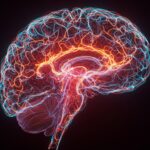A recently published case report in the Journal of Psychosexual Health describes a surprising and unusual side effect experienced by a young woman taking a common antidepressant medication. According to psychiatrists in India, a 25-year-old female developed a sudden onset of intense sexual desire and compulsive masturbation after her dose of escitalopram, a selective serotonin reuptake inhibitor, was increased. This unexpected effect completely resolved when the medication was discontinued, suggesting a clear link between the drug and this rare side effect.
Selective serotonin reuptake inhibitors, often referred to as SSRIs, are a class of medications widely used as a first-line treatment for various mental health conditions, including major depressive disorder, anxiety disorders, and obsessive-compulsive disorder. These medications work by influencing the levels of serotonin in the brain. Serotonin is a naturally occurring chemical messenger that plays a significant role in regulating mood, emotions, and overall well-being.
SSRIs function by blocking the reabsorption, or “reuptake,” of serotonin in the brain. This action increases the amount of serotonin available in the space between brain cells, known as the synapse, allowing it to have a greater effect. By increasing serotonin levels, SSRIs can help to alleviate symptoms of depression and anxiety for many individuals.
The case report details the experience of a 25-year-old married woman who sought psychiatric help due to symptoms of low mood, persistent fatigue, frequent outbursts of anger over minor issues, and suicidal thoughts that had been present for approximately six months. She reported a lack of interest in caring for her children and performing routine household tasks. These symptoms began after she discovered that her husband was having an affair. This revelation led to frequent arguments with her husband, and she experienced constant, intrusive thoughts and worries about the strained relationship, resulting in reduced sleep and difficulty concentrating.
Based on her symptoms, she was diagnosed with severe depression without psychotic features. Her treatment began with escitalopram, starting at a dose of five milligrams per day. Within a week, the dosage was increased to ten milligrams per day. She tolerated the medication well and showed signs of improvement in her depressive symptoms. However, she did not experience a complete resolution of her symptoms, and after two months, her psychiatrist decided to increase the dose of escitalopram further to 15 milligrams per day.
Within just five days of this dose increase, she began to experience a significant and distressing change in her sexual desire and behavior. She reported a sudden and intense increase in her sexual drive and became preoccupied with sexual thoughts. She described an overwhelming urge to masturbate throughout the day to relieve her sexual desire, and she actively sought opportunities to be alone for this purpose. She reported having sexual fantasies about engaging in sexual acts with random people.
Despite the ongoing conflict with her husband, she became insistent on having sexual intercourse with him and began behaving in a sexually suggestive manner towards him, which was a significant departure from her usual behavior. This sudden shift in her attitude and behavior caused her considerable distress. She also experienced restlessness and agitation, and despite the change in her sexual behavior, she continued to have episodes of crying and persistent suicidal thoughts.
Doctors considered the possibility that she might be experiencing a manic switch, a shift to the opposite pole of mood, sometimes triggered by antidepressants in individuals with bipolar disorder. However, she denied experiencing any elevated mood, increased energy, changes in her personal appearance, or feelings of grandiosity, which are typical symptoms of mania. Furthermore, her symptoms did not fit the criteria for a diagnosis of sexual obsession. Her medical history was reviewed for any prior medication use or substance use, but nothing significant was found. She denied experiencing similar symptoms in the past.
Routine blood tests, including a complete blood count and thyroid function tests, came back within the normal range. Considering the possibility that her symptoms were an adverse reaction to escitalopram, doctors used the Naranjo Adverse Drug Reaction scale, a tool to assess the likelihood that a drug caused a specific adverse effect. She scored an eight on this scale, indicating a “probable” drug-induced reaction linked to escitalopram.
As a result, escitalopram was stopped. To manage her depression, she was started on mirtazapine, another type of antidepressant. Due to the intensity of her anxiety, a low dose of risperidone, an antipsychotic medication, was added as an adjunct treatment. She was also prescribed an oral benzodiazepine to help reduce her anxiety in the short term. In addition to medication, cognitive behavioral therapy, a type of psychotherapy, was initiated. Within two to three weeks of these changes, she showed noticeable improvement in her symptoms, including both her depression and the hypersexual symptoms.
This case highlights a less common but potentially distressing side effect of SSRIs: hypersexuality, or increased sexual desire and activity. While sexual dysfunction, more commonly in the form of decreased sexual desire and difficulty achieving orgasm, is a well-known side effect of SSRIs, hypersexuality is reported much less frequently.
It is known that sexual dysfunction related to SSRIs can be dose-dependent, meaning it may become more pronounced at higher doses. This case appears to support this idea, as the woman only developed hypersexual symptoms after her escitalopram dose was increased to 15 milligrams per day. There is a previous case report of a 40-year-old man who experienced sexual overstimulation with escitalopram, developing spontaneous erections and ejaculation at a dose of only 10 milligrams per day. In that case, switching to a different SSRI, citalopram, resulted in decreased sexual desire and delayed ejaculation, illustrating that even drugs within the same class can have varying effects on sexual function.
It is important to recognize that case reports such as this one describe the experiences of a single individual or a small number of individuals. Therefore, they cannot establish cause and effect definitively in the same way that larger, controlled studies can. It is possible that other factors unique to this woman contributed to the development of hypersexuality. Furthermore, case reports may highlight unusual or rare occurrences, and the findings may not be generalizable to the wider population of individuals taking escitalopram. It is not possible to determine from a single case report how common this side effect might be.
Despite these limitations, case reports are still a valuable tool in medicine. They serve as an early warning system, bringing attention to unusual or unexpected drug reactions that might not be detected in initial clinical trials, which often focus on more common side effects and overall drug efficacy. Case reports can also generate hypotheses for future research and contribute to a more comprehensive understanding of the range of effects, both intended and unintended, that medications can have. This particular case serves as a reminder for both clinicians and patients to be aware of the potential for unexpected sexual side effects from SSRIs, even those that are less commonly reported.
The case report, “Escitalopram-induced Hypersexuality—Imbalance of the Sexual Seesaw,” was authored by Souganyadevi Mahalakshmi, Barath Ramanathan, Arun Selvaraj, Perarul Sivakumar, and Priyanka Ponnusamy.




